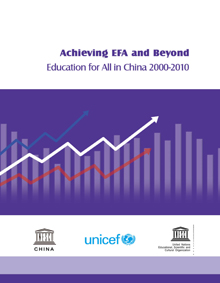Achieving EFA and Beyond: Education for All in China 2000-2010aims to take stock of China's progress towards the six Education for All (EFA) goals, understand how achievements were made, and identify the shortfalls, remaining challenges and prospects. This analysis draws lessons and insights from the many EFA actions taken across China for the purpose of generating further reflections and debates on EFA and the education agenda for the post-2015 era.
The report reviews successive Chinese government policies and plans related to EFA during 2000-2010 as well as more recent developments, and the progress made in each of the six EFA goals. Broadly speaking, China has either achieved or is on the verge of achieving most - if not all - the EFA goals and targets. This makes a review of its experiences in setting policies and implementing strategies of particular interest to the education and development field globally. While China's policy setting and implementation mechanisms are remarkably unique in many ways, a well-structured contextual examination of the process can bring to light many lessons learned for its own reflection as well as for interested readers in other countries. The former is increasingly pertinent as China's EFA successes are accompanied by still lingering gaps and needs, many of which involve access to and quality of education for disadvantaged population groups and rural areas. China's achievements in each of the EFA goals are briefly highlighted below:
China's EFA experiences show that social attitude in favour of education and people's readiness to support and participate in education play a determinant role in achieving EFA goals. A key lesson learnt is that strong government leadership and commitment to active government policy-making, planning, guidance and support to decentralized bodies are essential for advancing the EFA agenda. Education for All can only succeed when there is All for Education. China's decentralization consists of a clear central vision, policy guidance and delegation of authority to enable provincial and local governments to allocate their own budgets and resources and to leverage support and participation from local stakeholders. Spontaneous participation of people, communities, civil society organizations and the media in monitoring, supervising, promoting and supporting EFA implementation can be particularly effective in alerting and activating government actions.
Drawing inspiration from China's achievements and lessons learnt in EFA, innovative and well-managed use of ICT for learning can herald the transition of Education for All into a brand new era of Learning for All, when all people can truly learn anything at any time and in any place.
Download File:
EFA 10 year report - English





























